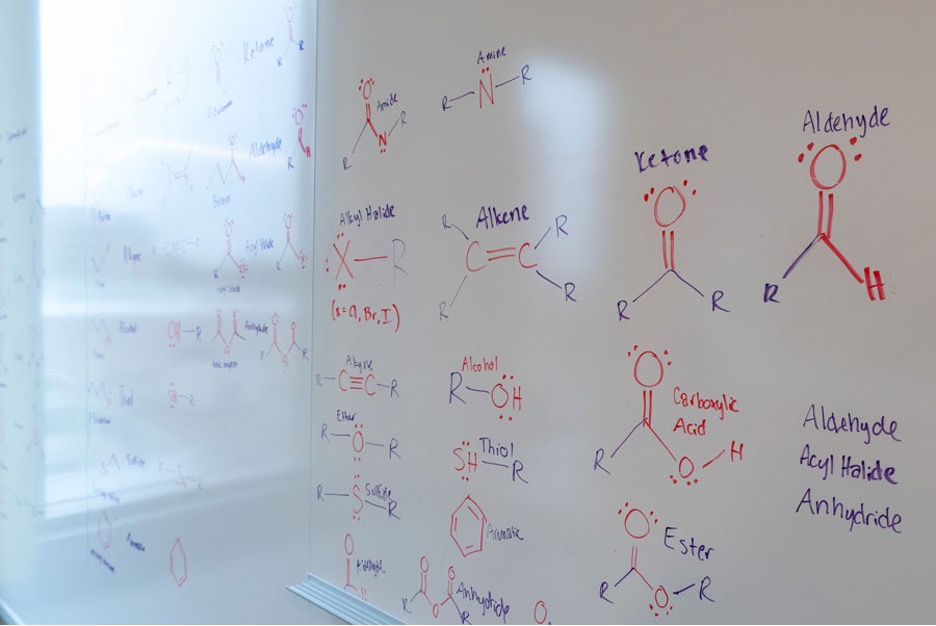AU’s Chemistry Research Advancing Solutions to Real-life Problems
It’s been a year since the Hall of Science opened its doors, and research is booming across the sciences. The work being done in the Department of Chemistry is addressing critically important issues facing our world, from disease prevention to chemical weapons proliferation.
Read ahead to learn about AU’s new forensics laboratory, interdisciplinary grants to study neurocognitive impairment caused by HIV on drug use, research on safer and cleaner fuel sources, and more.
A New Lab for Mastering Chemistry through Cooking
Associate Professor of Chemistry Matthew Hartings’ popular Chemistry of Cooking class has a new home in the Hall of Science — and students can actually taste test their first chemistry-cooking experiments for the first time. Previously, the associated lab courses were taught in a chemical laboratory, and students could only smell their creations.
A Crime “Room” for Forensics Teaching
Raychelle Burks is leading a retooling of AU’s Habits of Mind Forensics course to focus on a Crime Room for the laboratory component. The creation of a mock crime using a dedicated space on campus will allow students to learn the procedural and human side to data collection and analysis in the forensics field. They will need to collect data, catalog it, store it, and use proper techniques to prevent contamination of the scene.

Researching Safer and Cleaner Fuel Sources
Assistant Professor of Chemistry Alexander Zestos recently received an American Chemical Society (ACS) Petroleum Research Fund grant award to measure phenols using electrochemistry in petroleum samples. The grant, which supports fundamental research in the petroleum field, is one of the most prestigious awards offered by the ACS. Zestos will use carbon electrodes to measure phenolic impurities in petroleum processing that could potentially lead to safer and cleaner fuel sources.
Examining HIV and Drug Use for Treatment and Prevention
Alexander Zestos has also teamed up with Professor of Neuroscience Anthony Riley and received the District of Columbia Center for AIDs Research Pilot award to examine neurochemical and behavioral differences in HIV model mice. The award is intended to bring scientists from diverse background together to study and understand HIV. Zestos and Riley will study neurocognitive impairment caused by HIV on drug use and abuse as measured in the EcoHIV mouse model. While the implications of drug use on HIV are well known, this work will be one of the first studies to examine the effects of HIV on drug use and abuse, which could potentially help identify novel treatments and prevention strategies.
Using computers for pharmaceutical discovery and to fight the proliferation of chemical weapons
Professor of Chemistry Stefano Costanzi uses computers to study the interactions between chemicals and living organisms to support the discovery of new therapies. He is currently working to find chemicals that could be used for the treatment of genetic form of gigantism. In a separate research line, he is working on the development of computational tools that can help fight the spread of chemical weapons by supporting frontline officers and enabling relevant policy changes.
Cutting-Edge Equipment for Cross-Discipline Research
The chemistry department has established a partnership with scientific equipment corporation Shimadzu to acquire three new state-of-the-art instruments for separating and identifying materials. Placing these instruments in the Analytical Core allow cross-discipline research and student training in the advanced laboratories. There are now MS projects with committees composed of chemistry and psychology faculty to identify neurotransmitters, as well as chemistry and environmental science faculty to identify microplastics in sediments.
Merging Science with Policy, Business, and Law
The Department of Chemistry is designing a new non-thesis MS track named Chemistry and Society. It will foster interdisciplinary work between the chemistry department and fields such as policy, business, or law.